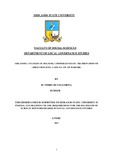Please use this identifier to cite or link to this item:
https://cris.library.msu.ac.zw//handle/11408/2774| Title: | The effectiveness of housing cooperatives in the provision of urban housing: case study of Harare. | Authors: | Muunganirwa, Ruvimbo | Keywords: | Housing cooperatives Urban housing Housing provision |
Issue Date: | 2017 | Publisher: | Midlands State University | Abstract: | The research main aim was to investigate the effectiveness of housing cooperatives in the provision of urban housing in Harare. A housing cooperative is a legal association formed for the purpose of providing housing to its member on a continuing basis. The introductory chapter highlighted on the background of the study citing the history of Harare city council that led to the emergence of housing cooperatives in the late 1980s. Housing cooperatives approach was adopted by many urban local authorities including Harare city council as a means to provide decent housing and accommodation to the ever growing population in urban areas since Harare city council and the government where facing challenges. The main research objective of the study was to investigate what challenges/constrains that prohibit housing cooperatives to deliver housing to its members under present conditions of crisis in Harare. A review of literature from published texts, internet sources and journals was gathered and analyzed in the context of the research objectives. The researcher used case study research design in carrying out the research and used a sample size of 70 respondents from Harare city council, Zimbabwe National Housing Cooperatives Organization and housing cooperatives members. Purposive sampling technique was used to select council and ZINAHCO employees’ respondents and convenience sampling technique to select housing cooperatives members’ respondents. Questionnaires and interviews were used as research instruments. The data collected was analyzed, interpreted and presented in the form of tables, graphs and pie chart. The overall response rate from the questionnaire and interviews was 87%. The major findings of the study showed that there are many challenges that are prohibiting housing cooperatives from been effective and these include political interference, inadequate finance and financial assistance and misappropriation and mismanagement of funds by the management committee as noted by the respondents. Despite the challenges, the finding of the study revealed that 75% of the respondents noted that housing cooperatives are proving to be effective in the provision of housing. Recommendations were made by the researcher for both the housing cooperatives and council for them to increase their ability in providing housing which include education and training for housing cooperatives committees, engaging financial institutions for financial assistance, enter into public-private partnerships and introduction of strict penalties to deal with corrupt members. | URI: | http://hdl.handle.net/11408/2774 |
| Appears in Collections: | Bsc Local Governance Studies Honours Degree |
Files in This Item:
| File | Description | Size | Format | |
|---|---|---|---|---|
| Final draft.pdf | Full Text | 904.45 kB | Adobe PDF |  View/Open |
Page view(s)
256
checked on Feb 14, 2026
Download(s)
142
checked on Feb 14, 2026
Google ScholarTM
Check
Items in MSUIR are protected by copyright, with all rights reserved, unless otherwise indicated.



